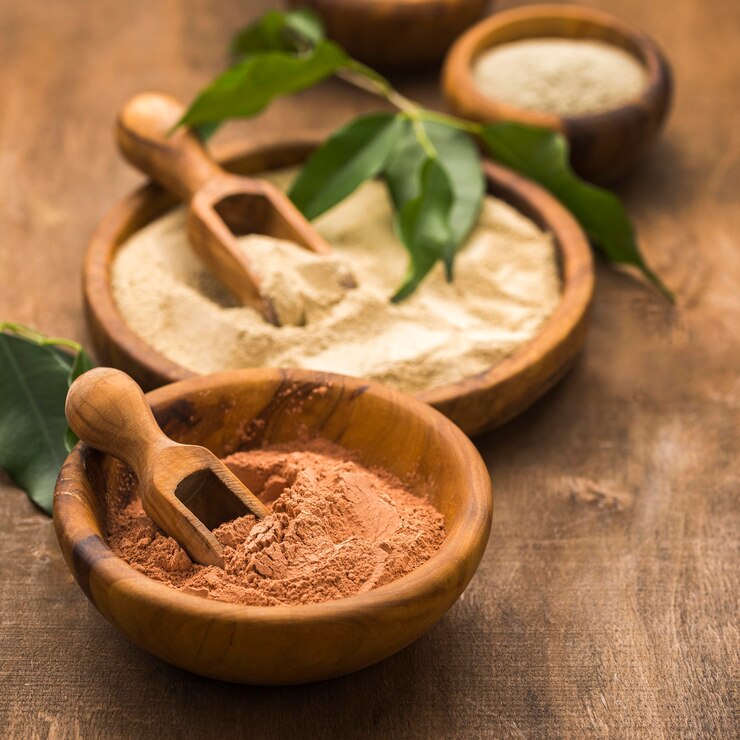Herbal face pack powders are becoming increasingly popular for their natural ingredients and multifunctional benefits. Unlike chemical-laden beauty products, herbal face packs are derived from nature’s bounty, ensuring skin nourishment while minimizing adverse effects. In this article, we explore the nutritional properties of herbal face pack powders, their ingredients, and their skin-enhancing benefits.
What is an Herbal Face Pack Powder?
Herbal face pack powders are powdered blends of natural ingredients such as herbs, flowers, seeds, and minerals. These powders can be mixed with water, milk, or other liquids to create a paste, which is then applied to the skin. The nutrient-rich nature of the ingredients makes them an effective skincare solution for various needs.
Common Ingredients and Their Nutritional Benefits
1. Multani Mitti (Fuller’s Earth)
- Nutritional Profile: Rich in magnesium, silica, and calcium.
- Benefits:
- Absorbs excess oil and impurities from the skin.
- Provides gentle exfoliation to remove dead skin cells.
- Brightens and tightens the skin.
2. Turmeric (Curcuma longa)
- Nutritional Profile: Contains curcumin, antioxidants, and anti-inflammatory compounds.
- Benefits:
- Reduces acne and blemishes.
- Soothes inflammation and redness.
- Promotes an even skin tone and natural glow.
3. Neem (Azadirachta indica)
- Nutritional Profile: Packed with nimbin, vitamin E, and essential fatty acids.
- Benefits:
- Treats acne with its antibacterial properties.
- Hydrates the skin and improves elasticity.
- Reduces dark spots and pigmentation.
4. Sandalwood (Santalum album)
- Nutritional Profile: Contains natural oils, beta-santalol, and antioxidants.
- Benefits:
- Calms irritated skin.
- Improves skin texture and reduces tanning.
- Imparts a cooling effect, making it ideal for sensitive skin.
5. Aloe Vera Powder
- Nutritional Profile: Enriched with vitamins A, C, E, and minerals like magnesium and zinc.
- Benefits:
- Deeply moisturizes the skin.
- Speeds up wound healing and reduces scars.
- Fights signs of aging with its hydrating properties.
6. Rose Petal Powder
- Nutritional Profile: Contains vitamin C, antioxidants, and flavonoids.
- Benefits:
- Hydrates and soothes dry or irritated skin.
- Promotes a youthful complexion by fighting free radicals.
- Adds a natural pinkish glow to the skin.
7. Fenugreek (Trigonella foenum-graecum)
- Nutritional Profile: High in niacin, potassium, and diosgenin.
- Benefits:
- Reduces dark spots and pigmentation.
- Fights acne with its anti-inflammatory properties.
- Improves skin’s overall texture.
8. Licorice Root Powder
- Nutritional Profile: Contains glycyrrhizin, flavonoids, and saponins.
- Benefits:
- Reduces hyperpigmentation and melasma.
- Brightens the complexion.
- Protects the skin from UV-induced damage.
9. Besan (Chickpea Flour)
- Nutritional Profile: Rich in protein, zinc, and antioxidants.
- Benefits:
- Acts as a natural cleanser and exfoliant.
- Balances oil production, making it ideal for oily skin.
- Reduces acne scars and blemishes.
10. Green Tea Powder
- Nutritional Profile: Abundant in catechins, tannins, and vitamin B2.
- Benefits:
- Detoxifies the skin and reduces puffiness.
- Protects against sun damage.
- Improves skin elasticity.
How These Nutrients Benefit the Skin
The nutrients in herbal face pack powders play a crucial role in maintaining skin health:
- Vitamins: Help repair and rejuvenate skin cells, promote hydration, and reduce signs of aging.
- Minerals: Balance the skin’s natural pH, regulate oil production, and provide essential nourishment.
- Antioxidants: Protect the skin from oxidative stress and free radical damage, reducing premature aging.
- Anti-inflammatory Compounds: Calm irritated skin, reduce redness, and soothe acne-prone areas.
- Essential Oils: Improve skin elasticity and add a natural glow.
Types of Herbal Face Pack Powders for Different Skin Types
1. For Oily Skin
- Multani mitti, neem powder, and sandalwood powder absorb excess oil.
- Besan and turmeric help control acne and minimize pores.
2. For Dry Skin
- Aloe vera powder, rose petal powder, and licorice root powder hydrate and nourish the skin.
- Fenugreek improves skin texture and prevents dryness.
3. For Combination Skin
- A balanced mix of green tea powder, turmeric, and sandalwood powder works well to hydrate and control oil production.
4. For Sensitive Skin
- Rose petal powder and aloe vera powder are gentle and calming.
DIY Recipes Using Herbal Face Pack Powders
1. Brightening Face Pack
- Ingredients: 1 tbsp sandalwood powder, ½ tsp turmeric, 1 tsp rose petal powder, and milk.
- Method: Mix into a paste and apply for 15 minutes. Wash off with lukewarm water.
2. Acne-Control Face Pack
- Ingredients: 1 tbsp neem powder, 1 tsp multani mitti, ½ tsp turmeric, and rose water.
- Method: Blend into a paste and apply to affected areas. Rinse after 20 minutes.
3. Hydrating Face Pack
- Ingredients: 1 tbsp aloe vera powder, 1 tsp licorice powder, and honey.
- Method: Create a smooth paste and leave it on the skin for 15 minutes. Wash with cool water.
Precautions When Using Herbal Face Pack Powders
- Mixing Agents: Avoid harsh chemicals when mixing the powders; opt for natural agents like rose water, yogurt, or milk.
- Frequency: Use 2–3 times a week for optimal results without over-exfoliating.
- Storage: Store powders in airtight containers to retain their efficacy.
Conclusion
Herbal face pack powders offer a treasure trove of nutrients that cater to various skin types and concerns. From brightening to hydrating, their natural composition ensures effective results without the risks associated with synthetic products. By understanding their nutritional profile and choosing the right ingredients for your skin type, you can unlock the full potential of herbal skincare. Embrace the power of nature and give your skin the nourishment it deserves!




